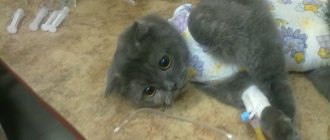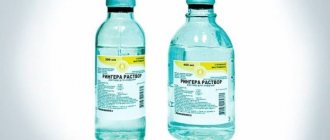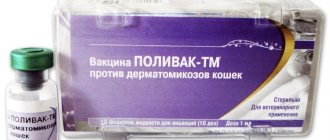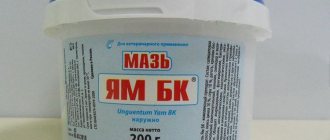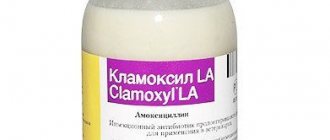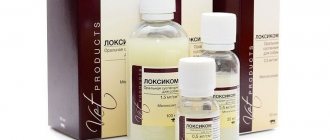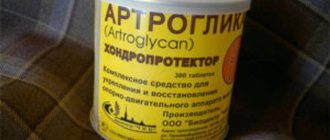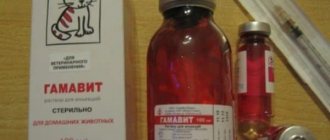Compound
Ringer-Locke (Solutio Ringer-Locke) is an isotonic solution and has a multicomponent composition, including a number of electrolyte salts:
- Sodium chloride – 8 mg/1 ml.
- Potassium chloride - 0.2 mg/1 ml.
- Calcium chloride – 0.2 mg/1 ml.
- Sodium bicarbonate – 0.2 mg/1 ml.
- Glucose – 1 mg/1 ml.
- Water for injection - for the base of the solution.
This is a type of Ringer's solution. S. Ringer, scientist. who established the composition and proportion of salts in a solution necessary to maintain life in an isolated organ. Ringer conducted his experiments on a frog, or more precisely, on its heart. Externally, the Ringer-Locke solution looks like ordinary water - it is not thick, colorless and transparent.
Release form and composition of Ringer-Locke solution
Available in the form of a colorless liquid for injection.
Packaged in glass flasks, hermetically sealed with rubber stoppers and metal caps. Bottle volumes are 100, 200 and 400 ml. Or plastic hermetically sealed containers.
1 ml of medicine contains:
- sodium chloride – 8 mg;
- potassium chloride – 8 mg;
- calcium chloride – 0.2 mg;
- sodium bicarbonate – 0.2 mg;
- glucose – 1 mg;
- water for injections.
The composition of the product is similar to blood plasma and is well accepted by the animal body.
The drug differs from Ringer's solution in the presence of glucose in its composition.
The drug differs from Ringer's solution in the presence of glucose in its composition.
Release form
The solution is usually produced in glass bottles of 200 or 400 ml . Less common is Ringer-Locka in plastic packaging. Regardless of the quality and shape of the container, the solution is produced only sterile. Glass bottles must be closed with rubber caps and rolled up with special aluminum caps.
Ringer-Lokka belongs to low-hazard substances (hazard class IV), even if it comes into contact with open wounds, it does not have an irritating effect and is available without a prescription.
Dosage and instructions for use for animals
For dogs and cats, the drug is administered by injection subcutaneously or intravenously. Intravenous administration is suitable for medium and large breed dogs and adult cats.
In kittens and small breeds of dogs, it is usually difficult to find veins; subcutaneous injection of the solution is possible for them. For subcutaneous administration, it is necessary to divide the dose and inject it into different places on the animal’s body for rapid distribution throughout the body.
Intravenous administration of the solution is carried out in the form of droppers in a stationary veterinary clinic.
Subcutaneous administration can be carried out at home as prescribed by a veterinarian.
The dosage and method of administration are determined based on their body weight and disease.
For small breed dogs and cats it is about 100 ml per day. For large breeds the volume can increase to 400 ml. The dosage is determined by the veterinarian.
For washing eyes and mucous membranes, it is used undiluted. The product does not cause pain or discomfort on open wounds.
Use for dilution of drugs and subsequent injection is prohibited.
Dosage and method of administration are determined based on body weight and disease.
The combined use of drugs in this form can provoke severe swelling and allergic reactions.
Application area
Its main effect as a medicinal drug is to replenish fluid and salts in the body. Therefore, it is used in appropriate conditions. These include:
- Dehydration of various origins.
- Intoxication: poisoning with heavy metal compounds, food poisoning, infections, helminthic infestations, extensive injuries, burns, etc.
- Blood loss.
- Shock states.
Ringer-Locke is also successfully used to cleanse and rinse wounds, cavities and visible mucous membranes (for example, eyes, mouth, etc.). These are the main directions for the use of Ringer-Locke and other isotonics.
Ringer-Locke has been successfully used in various animal species, incl. and in dogs. When it comes directly to dogs, the most common cases of using Ringer-Locke solution in postoperative therapy, for food and heavy metal poisoning, and for intoxications that occur during the course of infectious diseases. Less commonly, when removing animals from a state of intoxication in cases of extensive helminthiasis, extensive injuries and burns, in states of shock, and as a plasma substitute for blood loss.
The effect of Ringer-Locke solution stands out among other isotonics due to the presence of glucose in its composition. This combination of “ingredients” is most successfully accepted by the body in the treatment of dehydration, both when administered intravenously and subcutaneously, which is especially important when treating extremely dehydrated and emaciated animals.
This drug should not be used as a solvent for other medications. This drug has a fairly saturated composition and there is a possibility that any of its components may enter into an undesirable chemical reaction with the drug, requiring dilution.
Rules for using Ringer-Locke solution
Only a veterinarian can prescribe the drug after examining the pet. The medicine is administered intravenously or subcutaneously. The dose is determined by the doctor depending on the weight and disease of the pet. Initially, the recommended volumes of the drug for each species of individual look like this:
| Animal type | Dose (ml) |
| Cats | 5–50 |
| Dogs | 10–200 |
| Piglets, lambs | 25–100 |
| Calves | 200–400 |
| Small cattle | 100–300 |
| Cattle, horses | 1000–3000 |
How does it work?
- In case of poisoning with heavy metals, calcium chloride ions, which are part of the Ringer-Locke, turn into a solid, insoluble form, as if adsorbing onto themselves everything unnecessary.
- For allergic conditions, the same calcium chloride helps. It seems to “putty” the walls of blood vessels, reducing their porosity (permeability) and preventing the release of histamine beyond their limits.
- When treating dehydration and replacing blood loss, Ringer Locke's solution, when administered intravenously or subcutaneously, compensates for the lost volume of fluid and the required amount of salts, normalizing blood pressure and the condition in general.
Basic information
This is the name of the water-salt composition. It contains glucose, sodium bicarbonate, calcium and sodium chloride. Please note that you can also find a simple Ringer's solution on sale, which does not contain glucose. In principle, there is no particular difference between them. It’s just that if you need more support for the liver during treatment, glucose needs to be introduced into the body separately.
What can this drug be used for in principle? Firstly, as mentioned above, for almost all types of poisoning. “Ringer” is especially indicated for intoxication with heavy metal salts, since calcium chloride, which is part of this drug, transforms them into an insoluble state. The same applies to allergic reactions, since the same component significantly reduces the porosity of blood vessels and prevents the release of histamine and the liquid component of blood from the vessels. Of course, its effect in this case is not as pronounced as that of a pure solution of calcium chloride.
This medicine is very important in treating dehydration and eliminating its consequences. Since this composition is almost similar in its properties to blood plasma, the body accepts it easily and without any consequences. By the way, what volume of Ringer-Locke solution can be infused into a dog’s body? The question is quite complicated, since in this case everything depends on the size and weight of the dog. For small animals, the normal daily dose is one hundred milliliters maximum, but large dogs (St. Bernards, Great Danes) with severe dehydration may need 300-400 milliliters (sometimes more). In general, the dosage depends solely on the veterinarian and is selected based on the type of disease, its course, and the condition of the animal itself at the time of providing therapeutic care.
Contraindications for use
- Various edematous conditions and syndromes. For example, if a dog is suspected of having swelling of any organ, or the swelling is visible to the naked eye directly from the outside, then this is a direct contraindication for the use of any plasma substitute, including Ringer-Locke solution.
- Hypovolemia (this is a decrease in the tone of blood vessels, caused by extensive loss of blood and plasma, accompanied by an imbalance of blood cells (formed elements). Sometimes hypovolemia can be caused by disturbances in the processes of neuro-reflex regulation).
- For diseases of the urinary system. In such diseases, the use of isotonics is possible only when absolutely necessary and in combination with diuretics.
- Ascites, effusion pleurisy, liver cirrhosis.
- Blood acidosis
General information about Ringer-Locke solution
The drug is in liquid form. The solution is odorless and colorless. It is poured into dark glass bottles. Capacity - 100 ml. The composition of Ringer-Locke fluid is sodium chloride plus glucose, calcium chloride, sodium bicarbonate and purified water.
In its composition, the medicine is very close to the blood plasma of a cat, dog, or other pet. Therefore, the drug can be used in any dose.
General information about the Ringer-Locke drug:
- Absolute safety for the animal.
- Excellent efficiency.
- The ability to quickly get your pet back on its feet even with severe blood loss, deep wounds, poisoning, etc.
The drug is prescribed for the following pathologies in dogs and cats:
- Gastrointestinal disorders, poisoning (diarrhea, vomiting).
- Bites of poisonous insects, amphibians.
- Inflammatory processes.
- Injuries, including severe frostbite, 1st-3rd degree burns.
Additionally, Ringer-Locke solution can be used for plasmapheresis.
It is strictly forbidden to use the drug if the animal has severe or moderate edema, kidney disease (anuria, oliguria), or heart failure. Carefully prescribe infusions and injections to dogs and cats diagnosed with acidosis and hypovolemia.
Dosage and routes of administration
The dose of Ringer-Locke solution directly depends on the size of the animal and its condition. So, for example, for a small dog the daily volume of the drug is limited to 100 ml, and for a large dog – 400 ml. But in any case, this issue is resolved by a veterinary specialist.
Ringer-Locke solution is administered intravenously and subcutaneously, like most other isotonics, but most often it is used for intravenous transfusions. Used for various conditions that require replenishment of fluid and salts in the blood, for the administration of various drugs intravenously.
It should be noted that when administered subcutaneously, it is more effective to administer the solution in fractions. The required volume of the drug is injected in parts into different areas - the withers area on the left and right sides, the sacrum area, etc. Before use, consult a veterinarian!
Directions for use and dosage
The drug is used only parenterally. As a rule, it is administered intravenously, but subcutaneous infusions are also acceptable. The dosage varies significantly depending on the condition of the animal at the time of treatment and its size:
- Representatives of large and especially large breeds who are in serious condition can be injected with up to half a liter of solution at a time, but in such cases up to 300 ml can be injected intravenously, the remaining 200 ml is injected subcutaneously, fractionally, into different parts of the body.
- Dogs of medium breeds are allowed to administer up to 300 ml at a time, but the dose, as in the previous case, is divided (50% - intravenously, 50% - subcutaneously, in fractions, in different places).
- Representatives of small and toy breeds, as well as puppies, should not administer more than 50 ml at a time, but in extreme cases the dose can be increased to 70-80 ml, with the remaining 20-30 ml also needing to be administered subcutaneously. For very young puppies, no more than 25 ml of solution is injected at a time (and only subcutaneously, since it can be impossible to find a vein in them).
Limitations on the volume of the administered drug are associated with the danger of a sharp change in blood pH, oncotic pressure and other vital indicators. In addition, infusion of too much fluid has an extremely negative effect on the kidneys.
Reviews
- A very good option for saline solution. Used as a detoxifying agent for food poisoning in a VEO dog. The dog quickly recovered, and the owner was pleased. I will use it in my practice in the future.
- My dog was in an accident. I thought I wouldn’t make it through, I’d lost a lot of blood. Through my friends, I started looking for a donor for my pet, but the vet said there was no need. After such words, everything inside me just broke. I left my girl at the clinic, at the insistence of the veterinarian, and the next morning they called me and said that my Danochka’s condition had stabilized! The secret turned out to be unexpectedly simple - the Ringer-Locke solution turned out to be an excellent plasma substitute!
- I accidentally found out that you can wash your eyes and wounds with Ringer-Locke solution to clean them of dirt! Now there is no need to look for any special expensive solutions and lotions! Very pleased!
Where to buy Ringer-Locke solution in Moscow
Vet pharmacy "Gomeovet" offers residents of Moscow, the region, and other regions of Russia certified medications for animals at competitive prices. You can buy Ringer-Locke solution from us on such favorable terms:
- Additional advice from a veterinarian.
- Delivery of goods in Moscow or forwarding them throughout the country.
- Possibility of ordering any medications, even if they are currently out of stock.
- Payment for the purchase in a convenient way (cash, bank transfer).
We work with individuals, large and small commercial organizations, nurseries, shelters, etc.
For residents of Moscow there is a real pet store at the address: st. Zamorenova, 25/5.
